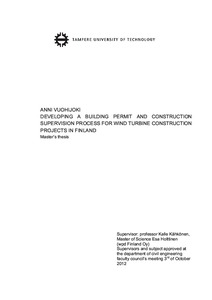Developing a building permit and construction supervision process for wind turbine construction projects in Finland
Vuohijoki, Anni Teija Orvokki (2012)
Vuohijoki, Anni Teija Orvokki
2012
Rakennustekniikan koulutusohjelma
Rakennetun ympäristön tiedekunta - Faculty of Built Environment
This publication is copyrighted. You may download, display and print it for Your own personal use. Commercial use is prohibited.
Hyväksymispäivämäärä
2012-12-05
Julkaisun pysyvä osoite on
https://urn.fi/URN:NBN:fi:tty-201301171019
https://urn.fi/URN:NBN:fi:tty-201301171019
Tiivistelmä
The objective for this thesis was to find differences between the wind park planning and construction processes in Germany and Finland. More specifically, the aim was to find an efficient permitting system for wind parks that could be used also on projects of larger scale. Alongside the permitting process, construction site and building supervision have been studied. As occupational safety has risen to a key role on improving efficiency and comfort of work, the research has also attempted to explore effective orchestration methods for building supervision.
The theory part goes through the history and development of wind turbines, their working principles and also briefly the wind park construction processes in Germany and Finland. Beside the Finnish system, German developing practices and regulations have been included in this research because the company who ordered the research is of German origin.
The empirical part of the study consists of interviews in municipalities that already have first-hand experience on wind park construction or are planning large scale projects. The surveys sought to identify the methods that are used in municipalities regarding the wind park permitting processes, the different terms and conditions that municipalities have, and the amount of royalties that have been taken from the permits.
The study was carried out in close cooperation with the town of Kalajoki, where the case study subject, Jokela Wind Park is located. The research was conducted in cooperation with Kalajoki, and the instruction guidelines will be taken into use in their wind park projects, which will be numerous in the coming decades. Also the town of Raahe is likely to adopt the permitting instructions to their use. Schedules and permit procedures have been planned for the project’s case study subject, Jokela. The requirements regarding the building permit for Jokela are gone through in this research.
From the research point of view, already when planning the construction it is important to understand the environmental factors that are always strongly related to the use of wind energy. The permitting process alone is longer due to environmental issues. As wind parks are becoming more common, and wind park sites are being included in regional plans, an effective permit process can be seen a contributor for more efficient construction.
The Ministry of the Environment is constantly developing the laws and legal acts for more efficient wind park construction. This research is intended to assist the developer in carrying out the permitting and supervision processes.
The theory part goes through the history and development of wind turbines, their working principles and also briefly the wind park construction processes in Germany and Finland. Beside the Finnish system, German developing practices and regulations have been included in this research because the company who ordered the research is of German origin.
The empirical part of the study consists of interviews in municipalities that already have first-hand experience on wind park construction or are planning large scale projects. The surveys sought to identify the methods that are used in municipalities regarding the wind park permitting processes, the different terms and conditions that municipalities have, and the amount of royalties that have been taken from the permits.
The study was carried out in close cooperation with the town of Kalajoki, where the case study subject, Jokela Wind Park is located. The research was conducted in cooperation with Kalajoki, and the instruction guidelines will be taken into use in their wind park projects, which will be numerous in the coming decades. Also the town of Raahe is likely to adopt the permitting instructions to their use. Schedules and permit procedures have been planned for the project’s case study subject, Jokela. The requirements regarding the building permit for Jokela are gone through in this research.
From the research point of view, already when planning the construction it is important to understand the environmental factors that are always strongly related to the use of wind energy. The permitting process alone is longer due to environmental issues. As wind parks are becoming more common, and wind park sites are being included in regional plans, an effective permit process can be seen a contributor for more efficient construction.
The Ministry of the Environment is constantly developing the laws and legal acts for more efficient wind park construction. This research is intended to assist the developer in carrying out the permitting and supervision processes.
